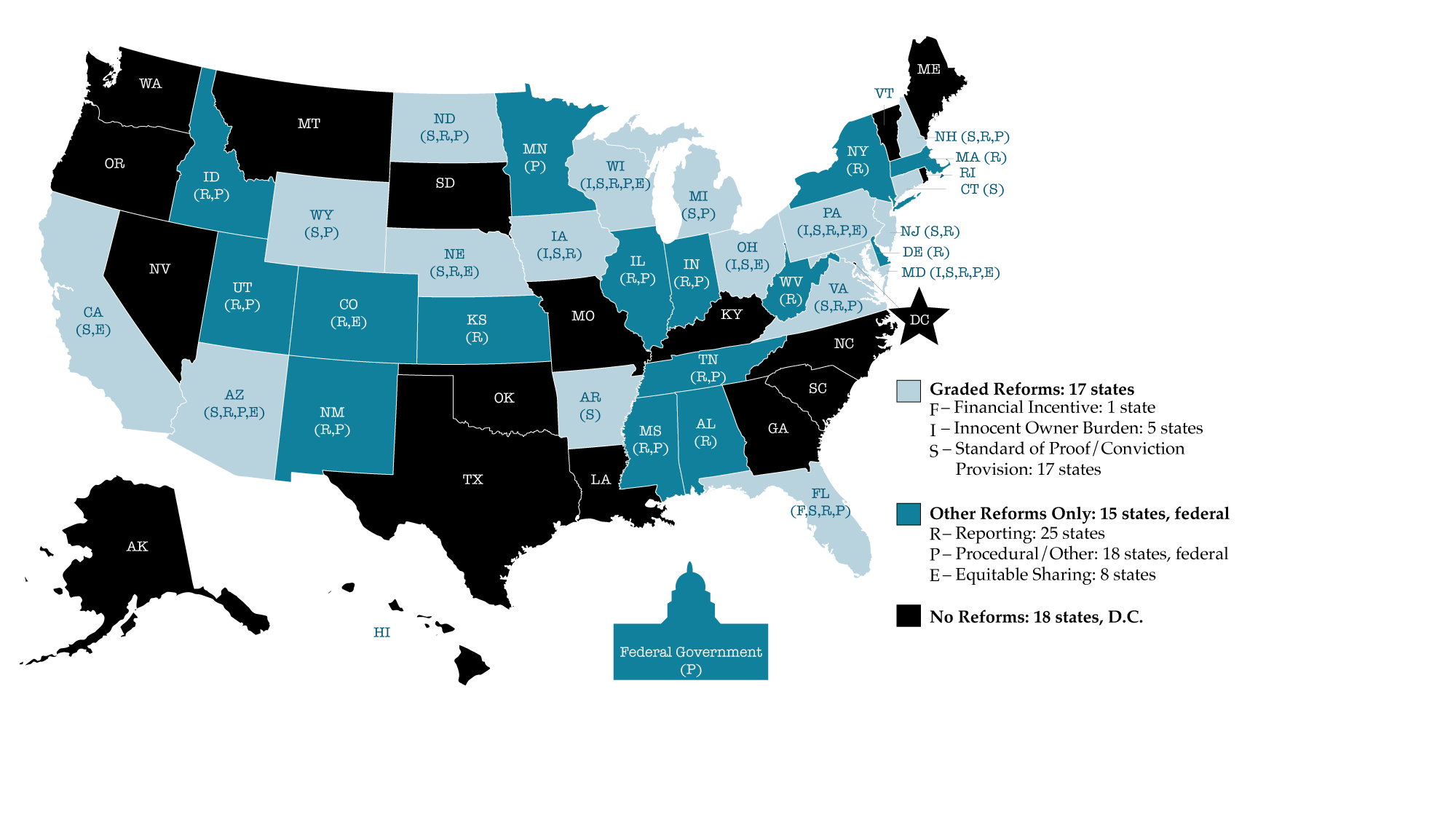5 states that reformed civil forfeiture laws – and one that didn’t
We looked at some of the states that have restricted civil forfeiture in recent years and some that haven’t.
We looked at some of the states that have restricted civil forfeiture in recent years and some that haven’t. At least 29 states have reformed forfeiture laws in the past decade.
The issues include:
Standard of proof: The hurdle the government must clear to forfeit property under civil forfeiture ranges from:
Probable cause: A reason to believe something is probably true. This is the lowest standard and is currently used in two U.S. states – Massachusetts and North Dakota.
A preponderance of the evidence: 51 percent or more of the evidence must be in the government’s favor. This is the standard of proof for civil forfeiture in South Carolina.
Beyond a reasonable doubt: The standard required for criminal conviction. The government must have clear and convincing evidence that something is true.
Who gets to keep the money?
In the federal system and in many other states, including South Carolina, law enforcement agencies get to keep all or most of the money or property once it is forfeited.
In some states, the money goes to the state’s general fund, to education or is used for drug addiction prevention.
Protection for innocent owners
Some states offer protection for innocent owners whose property is used illegally by someone else without their permission. In 10 states and the District of Columbia, the government must prove that the owner did something wrong before forfeiting property.
In South Carolina, the burden of proof rests on innocent owners, who must show they weren’t complicit in the illegal enterprise.
Transparency
Items seized under the new civil forfeiture law fill a trailer that San Juan County law enforcement officials drove from Farmington to the New Mexico State Treasurer Office in Santa Fe.
Items seized under the new civil forfeiture law fill a trailer that San Juan County law enforcement officials drove from Farmington to the New Mexico State Treasurer Office in Santa Fe.
CLYDE MUELLER/THE SANTA FE NEW MEXICAN
There are very few states with good data on civil forfeiture, making it tough for researchers to make conclusions, identify problems or come up with best practices for law enforcement.
Some states require law enforcement to file annual forfeiture reports with a state agency. South Carolina doesn’t have any statewide reporting system.
HELP US: Keep important community journalism alive. Subscribe today.
Three states — New Mexico, Nebraska and North Carolina — have abolished civil forfeiture entirely, according to the Institute for Justice, a law firm that advocates for forfeiture reform and files lawsuits on behalf of property owners in forfeiture cases. Any seizures made in those states are handled as a criminal forfeiture. In criminal forfeiture, a suspect must first be convicted in criminal court. The same judge and jury then determine if the seized property is connected to the crime.
Listed below are states that have made recent changes, as well as the status of federal forfeiture laws.
New Mexico (2015)
The first state that did away with civil forfeiture entirely, New Mexico uses criminal forfeiture, which takes property away from convicted criminals. Any money taken through the new forfeiture process is placed into the state’s general fund, not in the budgets of the law enforcement agencies that made the seizure. New Mexico is seen as the state with the strongest restriction on civil forfeiture, according to the Institute for Justice.
North Carolina
The state requires a criminal conviction for all forfeiture under state law but left open a loophole that allows local police to partner with federal agencies to process civil forfeiture cases under the much looser federal law. The federal government then gives a portion of the revenue to local agencies. Under North Carolina state law, forfeiture money goes toward public education, rather than the police agencies. Many state and local agencies have been using the federal program rather than the more restrictive state one, said Jeffrey Welty, director of the N.C. Judicial College at the University of North Carolina.
Nebraska (2016)
Nebraska is the third state to largely do away with civil forfeiture entirely. The state now requires a criminal conviction for any forfeiture and recently passed reporting requirements for law enforcement.
Other states have limited civil forfeiture while not completely abolishing the system. Fifteen states require a criminal conviction in order to forfeit property, though in some states the case is still handled in civil court.
Wisconsin (2018)
Already rated by the Institute for Justice as a state with strong forfeiture laws, Wisconsin is the most recent state to act on the issue. Wisconsin now requires a criminal conviction for forfeiture, and proceeds go to schools instead of law enforcement. State Sen. David Craig, one of the sponsors of the newest legislation, said forfeiture without convictions could violate the Constitution because it allows the government to take private property without going through a process to prove guilt.
Massachusetts (2018)
One of two states given the worst grade by the Institute for Justice for its civil forfeiture laws, Massachusetts approved some reform measures as part of a massive criminal justice reform bill in 2018.
North Dakota (rejected reform in 2017)
State senators in 2017 unanimously rejected a bill that would have required a criminal conviction before forfeiting property. The bill was, however, approved in the House of Representatives. There’s still public support for the reform, but the next actions may be in neighboring South Dakota, said Heather Smith, executive director for the state ACLU branches in both Dakotas and in Wyoming.
Smith said all that’s required for property to be forfeited is probable cause, the lowest standard. Innocent property owners whose property is used in a crime must also prove their innocence, and the state has little transparency, Smith said.
Some lawmakers have pushed to reform federal forfeiture laws, and former Attorney General Eric Holder restricted the equitable sharing program that allowed state and federal agencies to split forfeiture proceeds. But under President Donald Trump’s administration, former Attorney General Jeff Sessions rolled back those limitations, signaling an expanded use of federal forfeiture.
Federal government
With minimal standards for what can justify a forfeiture (preponderance of evidence), the federal government sets the tone for forfeiture and provides an option for states with more restrictive laws. It’s a method that allows local agencies to continue to use forfeiture even if state legislators pass reform bills. The federal government offers no protection for innocent owners if their property is seized, and all forfeiture revenue goes to law enforcement. The federal forfeiture program is enormous and rapidly growing, with nearly $10 billion in assets, up from $4.5 billion less than five years ago.
______
Have you lost property through civil forfeiture? Or do you have information about the practice we should know? We’d like to hear about it. Contact our reporters at taken@greenvillenews.com.






![skynews-kim-kardashian-reality-tv-star_5918849[1]](https://rucci.law/wp-content/uploads/2023/12/skynews-kim-kardashian-reality-tv-star_59188491.jpg)

![veteran-benefits-in-Oregon[1]](https://rucci.law/wp-content/uploads/2023/12/veteran-benefits-in-Oregon1.jpg)


